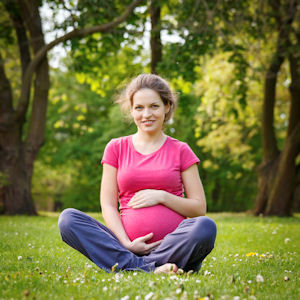London, May 13: Practicing yoga during pregnancy can help you reap health benefits like stress reduction and a decrease in a woman's fear of childbirth, according to researchers.
A new report from Manchester University researchers finds that it can ease stress and reduce women's fear of childbirth by a third, reports femalefirst.co.uk.
 In addition to its many other health benefits for pregnant women, including reduced cortisol levels, less difficult birth plus more full term and healthy weight neonates, pregnancy yoga is a low cost intervention too.
In addition to its many other health benefits for pregnant women, including reduced cortisol levels, less difficult birth plus more full term and healthy weight neonates, pregnancy yoga is a low cost intervention too.
Yoga teacher Natasha Harding has two children that she delivered naturally using her skills in the art.
"Yoga is a wonderful exercise to try during pregnancy, when you naturally want to take it a bit easier. It's ideal to ease many of the ailments that women suffer from when they're pregnant such as backache, sciatica and general aches and pains," she said.
"By maintaining a regular yoga practice during pregnancy the positions will become second nature with the aim being that the woman can have a more active labour with less intervention.
"My second baby was born in 51 minutes. It was because of the fact I did yoga every single day and felt so strong during the birth," he added.
Harding's five favourite yoga poses to try every day while you're expecting:
* Butterfly (Badha Konasana): This position allows the baby to move down into the pelvis and uses all the muscles that a woman draws upon in labour. The yoga guru BKS Iyengar claims if a woman practises this pose every day it will take the pain out of child-birth.
* Wide Legged Seated (Upivista Konasana): Stretching your legs in this position will encourage your hips to be more flexible which is clearly vital during labour. It's a great position to do every day if possible and leaning forward will gently stretch the back too and towards the end encourage the baby into a good birth pose.
* Staff (Dandasana): Staff pose is wonderful to sit in and circle your ankles and legs each day which will help with any puffiness you may be experiencing. When you combine breathing work too. you're helping to release your shoulders as well as creating much needed space in your abdomen and chest. It's a good one to try if you're getting heart burn.
* Cat (Marjariasana): with arm and leg lifts: Being on your hands and knees is wonderful for any pregnant women as it relieves symptoms of backache and encourages the baby into a good birth pose - our mums would have been told to wash the floors. By lifting the arm and leg you stabilise the pelvis which is vital during pregnancy.
* Down Dog - adapted for pregnancy (Adho Mukha Svanasana): A lot of women find their back aches a lot during pregnancy and Down Dog is a great stretch to try. When you're pregnant though you shouldn't do the full pose, so using the wall instead will give a similar stretch but it's much safer.






Comments
?ood d?y! ? c?uld h?ve sworn I've visited this site
?efore b?t after browsing through m?ny of the posts I realized ?t's new to me.
Anyways, I'm d?finitely pleased I f?und it and I'll
be book-marking ?t ?nd checking ?ack often!
my weblog ... proxy server software (Angelika: http://youtube.com/watch?feature=player_embedded&v=QPtVJYWkX6Y)
Add new comment